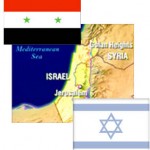Sunday
Mar072010
Middle East Inside Line: Mitchell Arrives, East Jerusalem Protests, Hamas's Shrinking Power?
 Sunday, March 7, 2010 at 8:17
Sunday, March 7, 2010 at 8:17  Mitchell in the Region: On Saturday, U.S. Mideast special envoy George Mitchell met Israeli Defense Minister Ehud Barak in Tel Aviv. He will meet Prime Minister Benjamin Netanyahu on Sunday and Palestinian President Mahmoud Abbas on Monday.
Mitchell in the Region: On Saturday, U.S. Mideast special envoy George Mitchell met Israeli Defense Minister Ehud Barak in Tel Aviv. He will meet Prime Minister Benjamin Netanyahu on Sunday and Palestinian President Mahmoud Abbas on Monday.Before any formal shaking of hands, Palestinian Authority leader Mahmoud Abbas escalated the rhetoric. In contrast to his acceptance of four months of "proximity talks", Abbas said that "the peace process has almost reached a dead end" because Netanyahu has refused to stand by compromise offers made by his predecessor. Abbas continued:
UN’s Top Gaza Official: “Israel Creating Generation of People Nourished on Despair”
Despite a temporary, partial freeze on building in the West Bank, the expansion of Israeli settlements, as well as an Israeli heritage plan announced last month to include West Bank religious sites threaten ... to open the door to a dark future that awaits us all.
The Israeli government continues to procrastinate to gain time and strengthen its control of the occupied territories to prevent any realistic possibility of establishing an independent, viable ... state of Palestine.
In response, Netanyahu not only dismissed calls for Israel to give up control of all of Jerusalem, but he said that an early deal for a Palestinian state is unlikely, given the strength of Abbas' rivals in Hamas.
Demonstrations in East Jerusalem: About 5,000 left-wing activists and Palestinians gathered Saturday to protest the eviction of four Palestinian families in the Sheikh Jarrah neighborhood of East Jerusalem. The demonstration was peaceful. Protesters carried Palestinian flags and chanted "Stop the destruction of homes" and "There is no sanctity in an occupied city."
Hamas Losing Control?: According to the London-based newspaper A-Sharq Al-Awsat, Hamas's senior military commander Ahmed Jabri has admitted losing control in Gaza in a letter to Hamas political chief Khaled Meshaal. He said that "recently a series of explosions has raised fears in Gaza" and "Gaza had descended into anarchy".
Jabri allegedly claims Hamas is convinced that extremist "jihadi" Islamist movements are behind the bombings.
Haaretz's Middle East Security Survey adds:
The recent calm on the Israel-Gaza border could be deceiving. Hamas is not firing rockets into Israel and is also preventing more radical groups from launching rockets. At the same time, Hamas is coping with the domestic threat posed by radical groups that identify with Al-Qaida. Recent reports from Gaza indicate that these groups are getting stronger, at the expense of Hamas.
It is possible that Israel, which until now has viewed Hamas as its biggest enemy in Gaza, needs to take into account that within a couple of years Hamas will be the moderate force in Gaza protecting the calm while a monstrous and more dangerous threat is growing in the form of the ultra-radical groups.



